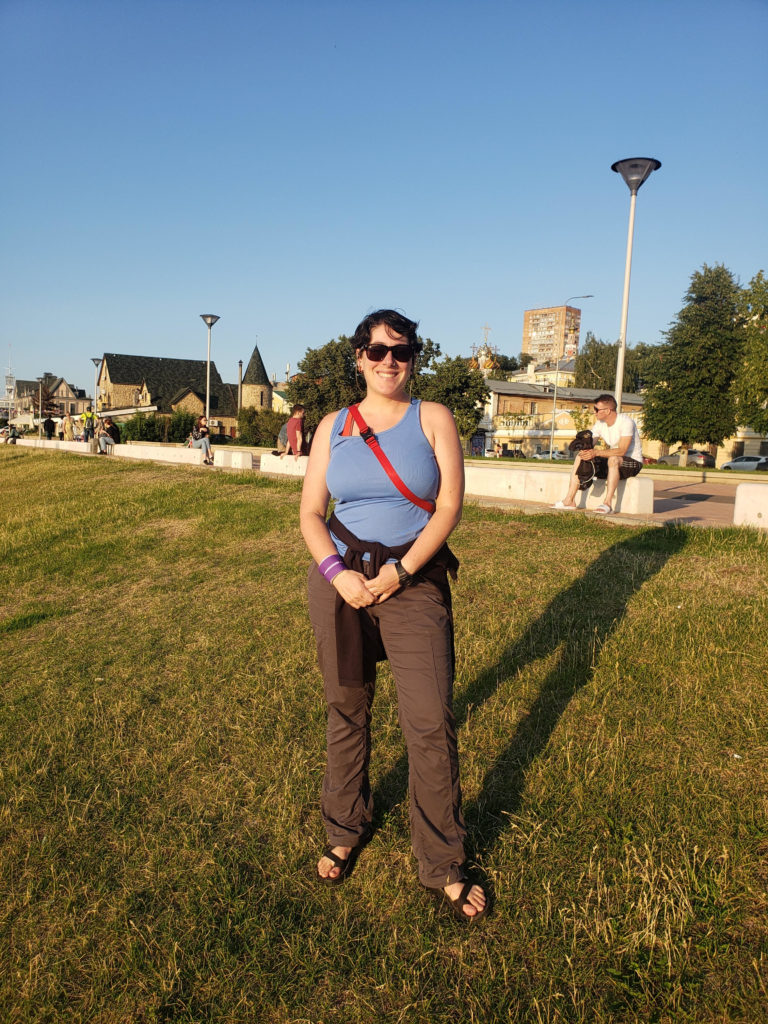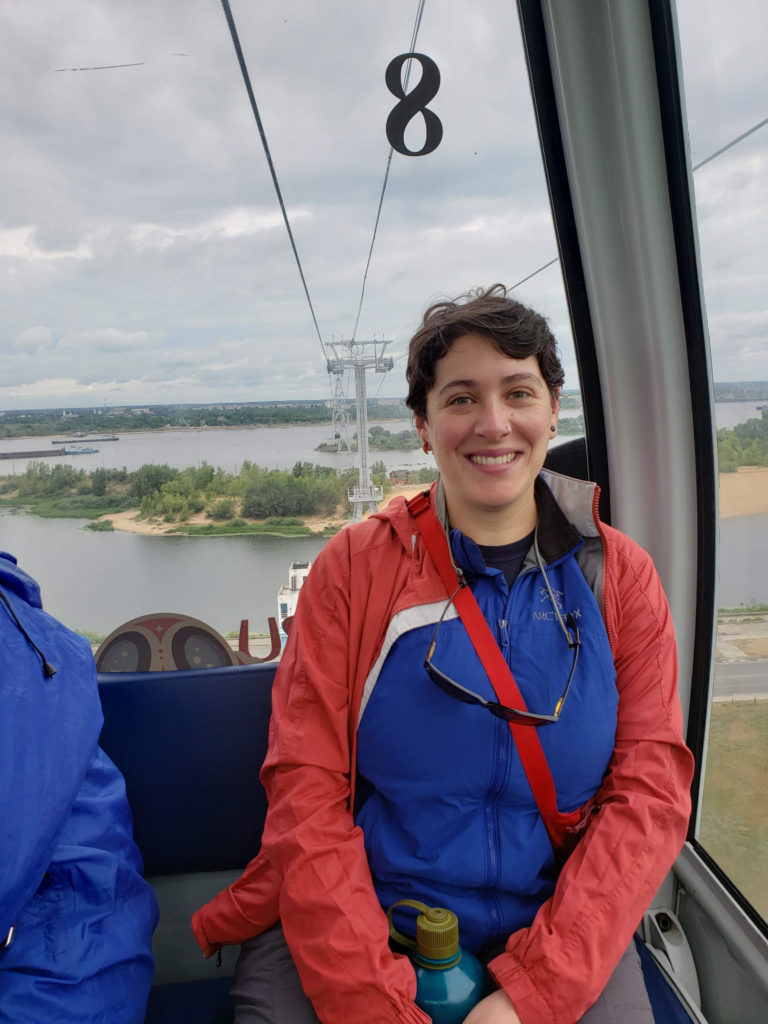With travel restrictions still in place due to Covid-19, few students will be able to leave the U.S. for research purposes this summer. With that in mind, we wanted to highlight some past travel experiences in an effort to boost morale and keep our motivation high for when we are able to travel once again.
I spoke with PhD candidate Miriam F. Lipton about her adventures in Russia during summer 2019 as part of her U.S. Department of State Critical Language Scholarship. CLS awardees serve as U.S. ambassadors in their travels abroad while immersed in cultural enrichment experiences and intensive language instruction.

Can you give us the specifics of your trip?
(when, specifically where, how long, where did you stay, etc.)
I went to Nizhny Novgorod for 10 weeks in the summer of 2019. Starting mid-June to the end of August. I stayed with a host family. CLS offers programs for different languages, while each program is slightly different, I can speak to the experience in the Russian language program.
For Russian there were four Russian sites, Nizhny (where I was), Vladimir (in Russia), and then Bishkek (Kyrgyzstan), and Tbilisi (Georgia). All four sites had various levels of Russian language competency. The program requires that each applicant have at least 2 years of Russian (although they changed that requirement for this upcoming year). And each site is a mix, which is to say, for example, Nizhny is not just for advanced students. There were about 15 students at each site. So, about 60 people received the award for Russian out of more than 5,000 who applied.
Before I left, we had a mandatory 2-day orientation in Washington D.C. All expenses were paid, from door to door, and we received spending money for our time in Nizhny.
For all the Russian sites, each student lived with host families. We were given a small questionnaire about family preferences, but other than that, we had little choice in where we stayed. On site, we were under a language pledge, meaning we had to speak Russian at home with our families (mine didn’t speak any English), and at all times when we were at school or on excursions.
Do you have any fun facts/trivia about where you went?
Can you contextualize where the city is?
Oh boy do I!
Nizhny Novgorod is about 8 hour drive east of Moscow. It was the city of Gorky during the Soviet era, named after Maxim Gorky, a Soviet writer, because he was from there.
Nizhny Novgorod was also one of the host cities for the 2018 Fifa World Cup, and as a result, now has a giant stadium.
Because of the factories in Gorky (Nizhny Novgorod), it was actually a closed city during the Soviet period. Meaning, no foreigners were allowed to enter, and even Soviet citizens had to have reason to come and go. They built the tanks and other armaments in Gorky.
In the 17th century, there was a famous battle in Nizhny where they defeated the Polish and basically started the Romanov dynasty (the Tsars).
It also has a modern cable transportation system over the river, which is the “largest unsupported” cableway of its type in Europe.

What was a typical day like during your stay?
Every week day we went to school where we attended different classes. Grammar, conversation, media, phonetics, literature, etc. After class we would usually have a cultural excursion about three times a week. We went to a petrol factory, the tank museum, a mosque, a walking tour of the city, we saw Russian films, we went to a stone factory, art museum, etc. On the weekends we would usually have a full day excursion. One time we had a full weekend excursion, and one weekend we were free to travel outside of our oblast’ (Russian equivalent to a county or state). On the weekend trips we went beyond Nizhny. For example, we went to a gingerbread factory. On the weekend long trip we went to Vladimir (a famous Russian city).

On our free weekend, I went with three other girls to Kazan, the Islamic center of Russia. It was really cool because everything was in both Russian, and Tatar (an ethnic language of the region).
We also had language partners, with whom we had to meet three times a week, and we couldn’t do homework with them, but other than that, it was fair game. I LOVED my language partner and we are still friends today. We chat over WhatsApp all the time (side note, I also LOVED my instructors. I WhatsApp with them too). We studied at Lobachevsky University. We were issued student IDs and were with the other students on campus, although we had classes just with the CLS people. With my language partner I did a lot of things. We ate at and found all the vegan food in town. We even did a Spin class together! We also had HW every night. Probably about an hour to two hours. So our days were packed. I basically never had free time to just sit and do nothing.

What sort of cultural enrichment experiences did you have while in Russia? Do you feel you fully immersed yourself in the culture?
I was really into my host family. We got along great. Rumor has it, she was chosen to be my host mother because I was the only vegan and she fancies herself quite the cook (which she totally was/is) and took me in because she wanted to try and learn how to cook vegan foods. She even gave me a Russian vegan cookbook as a departing present. Something she totally was not obligated to do. It was really sweet.
However, I loved my family, and my host mother’s parents lived in the next town over in a small dacha (like a summer home). On the weekends, we went to the dacha. I don’t think we would have gone had I not liked it, but it became a ritual, and it was something I looked forward to every week. At the dacha we went to the banya (a Russian style steam room), that my host grandparents built from scratch. There we got naked (just the women and later the men), and we would steam and talk, and drink water and tea made with herbs and berries from the garden. It was magical. We would usually spend about 2 plus hours in the banya every time. And when we were steaming, we would beat each other with birch leaves (it’s a custom). I was told that I was the first person to do CLS in Nizhny who actually loved the banya. And boy did I. In fact, there are funny banya hats that we often wear, because the hair gets really hot inside, and my language partner knew how much I loved the banya and bought me one as a gift. It was really sweet. Also, I loved my host grandmother. She was great. We got along splendidly. We would cook together, and she made me so many vegan treats. It was divine!
Were you able to maintain a vegan diet?
Yes! So, like I said, my host mother was really intrigued with the idea, and liked making me vegan meals. There was also a vegan restaurant right next to the university which did a lunch special every day, so for about $2 I could get a soup, a main dish, and a salad. I also sometimes just went there for a snack. There were also vegan restaurants around, so it was pretty easy.
There is a movement in Russia that is all about having a healthy lifestyle. This includes working out and eating healthy, and a part of that is being vegan, so actually, people were pretty familiar with the idea, and lots of restaurants were accustomed to the notion. Also, having been there before, I knew of a lot of Russian food that is just vegan by default, and it helps that I love Russian vegan food. So, I was down for it all!
In what ways did you serve as an ambassador on your visit?
Did you encounter any mistrust, dislike, or generalized perceptions of U.S. Americans?
I think because I had been to Russia many times before (and even did a CLS once before in 2009), I was familiar with Russia and what to expect. A lot of my cohort had difficulties with their host families or with their language partners, but I think because of my experience, it was not a culture shock for me (which is where I think a lot of the hardship/disconnect originates). So, I never really faced any problems. I think my command of the language and willingness to talk to everyone really helped as well.
For example, I remember a time when I was on the bus home and my mom called me, so I broke my language pledge and spoke to her). I ended the call, and then got off the bus a few minutes later. My stop was right next to the hockey stadium, and there was a game that day, so a lot of fans were exiting the bus at the same stop as me. Well, a woman was really lost and didn’t know where the stadium was. Of course, I knew, so I told her. At first, she didn’t really want to talk to me, and even told her friend, in Russian, that I am an American and don’t speak Russian, but then when I started talking to her, she warmed up, and we started chatting. She told me about the hockey team, and even how to snag discount tickets. I took her up on the offer, and a few days later, I was the at the game (with my language partner and others in my cohort), and I ran into her again. It was really nice to make that connection. She came right up to me and we all chatted. It was really fun.

Do you feel your language skills improved during your time in Russia?
IMMENSELY! We got tested before and after. My before score was not official, but rather just to get a ballpark of improvement, however, I tested at the intermediate level on the pre-test. At the end, I tested at the advanced level, just shy of native fluency. Not everyone made that much improvement, however. Even students who were higher than me at the beginning didn’t improve as much.
I was really dedicated to the process, and having done it before, I knew how much I could improve. Even though we had grades, they didn’t really matter, and because of that, many students didn’t really try all that hard. I did all my homework, I spoke Russian all the time, even when I technically could have spoken English (like when I was home, I chose to interact with my host family rather than be in my room and call family, for example). It isn’t easy learning a language, especially in an immersive environment, it is really easy to just slide into your host language, but I knew the program was short, and I wanted to take advantage of every possible second. I think being older and more goal oriented also helped. I wasn’t there for a free vacation, like some people, but there to do a job–get better at Russian.
Do you still keep in contact with your host family?
Absolutely. We chat on WhatsApp regularly. We send photos of each other and what’s going on. Same with my language partner and teachers. I hope to visit them someday, next time I am in Russia.
CATEGORIES: Graduate Students
